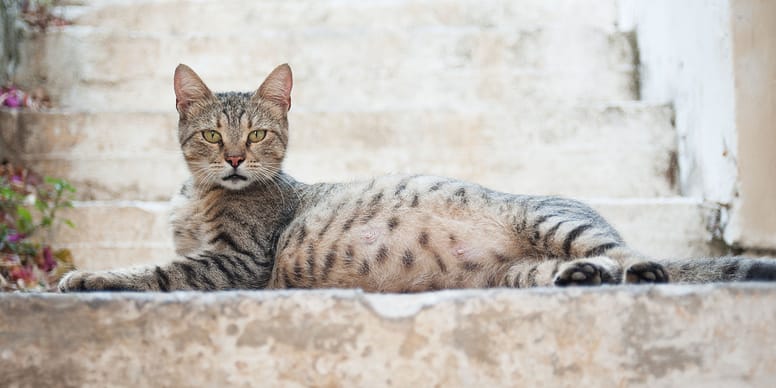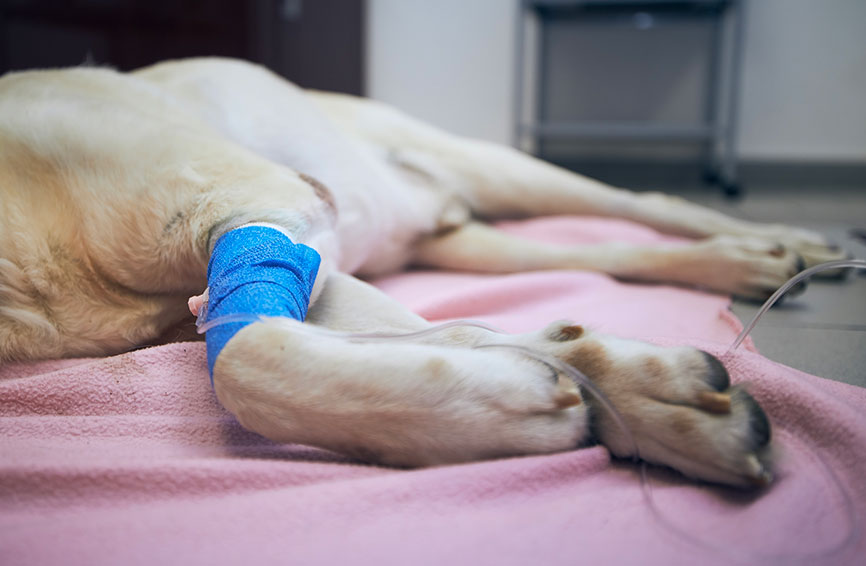
How to recognize a pregnant cat?
Early recognition of pregnancy is important to best prepare your cat for giving birth. Here are the main signs that indicate that a cat is potentially pregnant:
- Stopping heat : if your cat was in heat before being in contact with a male, she generally stops showing the signs specific to this period. Repeated meows should only be a distant memory, as should the associated behaviors (agitation, urine marking, etc.).
- Behavioral changes : one of the first signs of pregnancy in a cat is the change in her behavior. She may become more cuddly, seeking more attention and physical contact with you. Furthermore, your feline may also be calmer and favor rest rather than play or exploration.
- Physical changes : progressive weight gain and abdominal enlargement are common in pregnant cats, linked to the development of kittens in the uterus. However, not all cats gain weight significantly. These body variations can be more or less pronounced depending on the size of the litter and the individual characteristics of the animal.
- Increased appetite : an increase in appetite is often observed in pregnant cats. She begins to meet the growing nutritional needs linked to her gestation. It is also important to provide quality food, suitable for pregnant cats.
- Increased thirst and frequency of urination : the cat drinks and urinates more frequently.
- Swollen udders : they become more visible and sensitive to touch. You may also notice that they appear darker than normal. Drops of milk may appear at the end. Lactation begins gradually, with a view to breastfeeding the kittens. These changes are caused by the hormonal impregnation of pregnancy.
- Nesting behavior : As gestation progresses, your cat searches for a comfortable place to prepare for giving birth. In addition, she may become more demanding about the cleanliness of the litter box.
- Palpation of fetuses : It is sometimes possible to palpate kittens in the cat's uterus during an examination.
Not all cats react to pregnancy in the same way, as symptoms may vary from one individual to another. Sometimes some signs are subtle and go unnoticed, especially early in gestation.
If you have any doubts, it is best to consult a veterinarian. Only an animal health professional can confirm the pregnancy using additional tests. In addition, he will provide you with specific advice on the care to be given to your animal.
How does mating take place in cats?
Mating in felines is a process that takes place in different phases:
- Coming into heat : it all starts when the cat enters the estrus phase. During this period, which generally occurs every 15 to 21 days in unspayed females, the female cat emits signals to attract males. Signs of heat include frequent vocalizations, excessive rubbing against objects and people, specific posture, and general restlessness.
- Encounter : the males detect the signals of the cat in heat and gather around her. Several males may be attracted to the same female, sometimes resulting in fights intended to gain her favor.
- Seduction : the male designated by the cat begins to follow her closely. He can sniff her, lick her and nibble her neck. These behaviors aim to stimulate the cat and prepare it for mating.
- Coupling of the cat: once the cat is ready to accept the male, mating takes place, which triggers ovulation of the female. This phase is very quick, lasting only a few seconds.
- Post-mating : after mating, the female can become aggressive towards the male, a habitual behavior which ends the encounter.
The cat can mate with several cats during her heat, the kittens of a litter can therefore come from different males. It is essential to understand that feline reproduction is a natural and instinctive process.
⚠️ If you do not plan to raise kittens, it is strongly recommended to spay your cat or neuter your male, to avoid unwanted litters. It also helps prevent cat overpopulation and maintain the health of your pets.
Pattounes in your mailbox?
Let's go !
What are the stages of cat pregnancy?
Gestation in cats generally lasts 63 days and is divided into several stages. Each of them is closely linked to the progressive development of kittens:
- Weeks 1-2 : fertilization and implantation. It all starts with fertilization of the cat, during which the male's sperm fertilize the cat's eggs. Mating occurs during the cat's heat, an easily identifiable stage of the sexual cycle. During the first weeks, embryos form and begin their movement towards the uterus.
- Weeks 3-7 : development of kittens. It is during this period that the kittens' organs begin to take shape. The cat's abdomen enlarges and its appetite becomes increased. It is at this point that an x-ray can be taken to find out the number of kittens in the litter.
- Weeks 8-9 : labor and birthing. Kittens experience rapid growth, gradually taking up space in the uterus. At this point you can feel the kittens moving. The cat begins to look for a quiet and cozy place to give birth, marking the period of preparation for birth.
Each of these stages is essential for the development of kittens. It is therefore imperative to provide the cat with proper careincluding an enriched diet, to ensure health and well-being.
What specific care should be given to a pregnant cat?
Providing appropriate care to a pregnant cat is essential to ensure her health and the optimal development of unborn kittens. Here is a non-exhaustive list of precautions to take with your feline during pregnancy:
- Adapted diet for a pregnant cat. The latter needs a qualitative and balanced diet, to support the development of its kittens. Foods must be adapted to the physiological status of the feline, that is to say rich in proteins and essential nutrients, such as calcium and iron. They will be recommended to you by your veterinarian.
- Regular consultations : during pregnancy, your cat must be closely monitored by a veterinarian. Visits allow you to monitor your health, check the kittens' growth and detect any possible problems. Your veterinarian can also recommend appropriate treatments.
- Supplements : you can give food supplements to your cat to ensure a complete supply of nutrients. Calcium supplements may especially be necessary if the cat is at risk of developing a deficiency. These supplements must be subject to a medical prescription.
- Rest and calm : Make sure your cat has a quiet, comfortable and secure place to rest. She can become anxious as birth approaches, so it is essential to provide her with a calm environment.
- Moderate exercise : physical activity is important to keep your pet in shape, but it is preferable to limit its intensity during pregnancy. Gentle games are preferred.
- Hydration : your cat must always have access to clean, fresh water. Hydration is essential for your health and for your future lactation.
- Vaccinations and antiparasitic treatments : make sure to keep your feline's vaccination schedule up to date before pregnancy. Indeed, vaccines can be dangerous during pregnancy. Regarding internal and external parasites, it may be interesting to put a prevention plan in place.
Providing specific care to a pregnant cat is essential to ensure her health and that of her future kittens. Always consult your veterinarian for personalized advice and appropriate medical monitoring throughout gestation.
What are the risks associated with feline pregnancy?
Pregnancy carries certain risks for the cat. It is essential to be aware of this, in order to take preventive measures. Here are the main risks associated with feline pregnancy:
- Uterine infection : also known as metritis, it can occur after giving birth. This bacterial infection is favored by poor hygiene conditions. Symptoms include lethargy, fever, loss of appetite and abnormal vaginal discharge. This disease is serious and requires rapid veterinary intervention.
- Hypocalcemia : also called eclampsia, this condition results from a calcium deficiency. It can cause seizures, although it is more common in female dogs than in pregnant cats.
- Miscarriages : they can occur at any time during gestation, due to infections, trauma or hormonal disorders. A cat that is bleeding, contracting, or expelling dead kittens should be examined by a veterinarian.
- Dystocia : it occurs when parturition does not take place normally. These could be kittens that are stuck, poorly positioned, or too large to pass through the pelvis. Dystocia is dangerous for the cat and her young, and requires immediate veterinary assistance.
- Associated pathologies : Cats who have pre-existing health problems (diabetes, heart problems, etc.) are at greater risk of complications during pregnancy. Close monitoring is necessary in this case.
- Too many range : if the number of kittens is very high, the cat may have difficulty feeding them. Nutrient deficiency may occur in the mother and her kittens.
- Neonatal mortality : Newborn kittens are vulnerable and exposed to the development of infections, respiratory problems, etc. It is important to monitor them closely from birth and consult a veterinarian if in doubt.
To minimize the risks associated with feline pregnancy, consult your veterinarian regularly. Good prevention, combined with careful monitoring, is essential to ensure the health of the pregnant cat and her kittens.
What to do when giving birth to a cat?
Giving birth to a cat is a delicate moment. Here are some tips to help your pet during this process:
- Prepare a quiet and comfortable place : a box or basket large enough and with low walls will allow your cat to enter and exit easily. Place clean, soft towels there for the comfort of the cat and kittens.
- be careful : Watch your cat carefully, but be careful not to disturb her too much. Prepare a first aid kit including latex gloves, sterile scissors, towels for drying kittens and a thermometer. Also have the phone number of your veterinarian or an experienced breeder handy, in case of complications.
- Offer water and food : Make sure your pet has access to fresh water. A bowl containing high-quality food, rich in protein and energy, must be provided to meet its needs.
Book a vet visit: Schedule a consultation after giving birth to check that the cat and her kittens are healthy.




